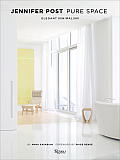Books |
Jennifer Post: Pure Space: Elegant Minimalism
Anna Kasabian
By
Published: Apr 18, 2012
Category:
Art and Photography
I’d never heard of Jennifer Post until I read about her book party in New York Social Diary. The cover had few words: Pure Space. Elegant Minimalism. The cover photo had a wall of glass. A penny dropped — this book held design clues.
I googled Jennifer Post. And discovered at “an home” piece about her on the same site. Turns out that she lives in a mostly white, stripped bare apartment in The Apthorp — her apartment is a lot like the one I had there, just a zillion times better done.
Post’s signature is minimalism of a very high order. Her white paint isn’t what you buy at Home Depot, it’s a special, secret formula. She knocks walls down and repositions them, and not for the feng shui of it. Given her druthers, she banishes baseboards. And most furniture. And, for that matter, possessions.
People think that minimalism is cold, but I show it as elegant, sophisticated, warm and inviting,” she says. “My rooms are happy rooms — whoever lives there is happy, People begin to realize how much more freedom they have. Once I’m done, they appreciate how much easier it is to live without two or three sets of plates.
And make no mistake: Her clients pay for the privilege. There are no scholarship cases among them; she’s got Simon Cowell and Jennifer Lopez and zillionaires who look down on us from the heights of the Time-Warner tower. As she likes to say, she’s not a BMW: “I’m a Bentley.”
What do her clients see in white rooms with no wood in sight?
Peace. Serenity. Relief. And — let’s say it bluntly — every kind of distance from the world. Better believe I rushed to get my hands on “Jennifer Post: Pure Space.” [To buy the book from Amazon, click here.]
What’s in these 240 pages for us vulgar little people?
To quote Jennifer Post: "I think you have a lot more freedom and time without all the clutter."
Agreed. But unlike Ms. Post, I don’t mean that esthetically. I mean it as a practical matter — as a political-economic decision. As follows: I know they talk a good game, but I don’t believe for one second that the gasbags, idiots and greedheads currently leading companies and governments and “serious” television shows have the least interest in saving the middle class. I think we’re in the last reel of the Titanic movie: every man for himself. And I think, therefore, that it is better to cash out, store up nuts for the winter, and live light and simple before the next wave of bad news hits and we’re tossing furniture into the furnace for fuel.
In the story of Milarepa, perhaps the greatest of Tibet’s saints, there’s a lovely anecdote. At the end of his life, Milarepa retreated to a cave to meditate. His diet was nettles. His chest hair turned green. People who saw him thought he was a caterpillar. His one possession, a bowl, cracked. Milarepa’s response was to bless God for showing him the folly of possessions. When he died, the sky was filled with angels.
My destiny may not be to become an angel. But it is certainly not to live as a hoarder. Jennifer Post has given us 240 pages to dream on. Somewhere in that dream may be an idea you can use to create a small patch of heaven.


